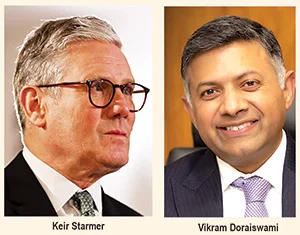Midweek Review
National Voters’ Day celebration amidst economic chaos, deepening political uncertainty
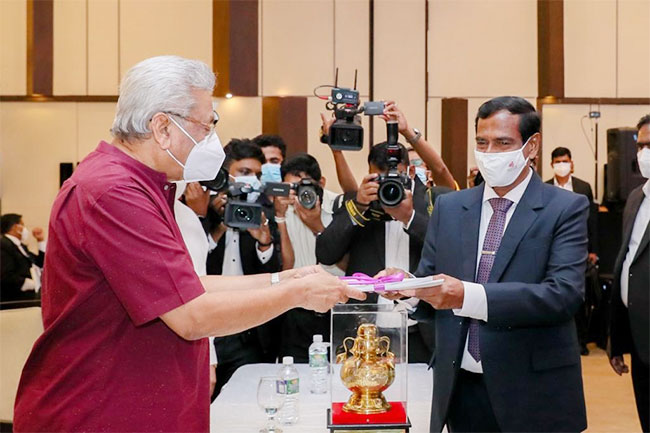
Poor response from political parties
By Shamindra Ferdinando
Nimal Punchihewa, soft spoken Chairman of the Election Commission (EC), didn’t mince his words when he underscored the loss of public confidence as well as overall disappointment in the electoral system last week. Punchihewa stressed the need for far reaching changes in the electoral system while reiterating the EC’s proposals meant to improve and discipline utterly corrupt and wasteful electoral processes. The continuing failure on the part of Parliament to address the grievances of the electorate would be catastrophic and may pose a threat to political stability, he warned.
Attorney-at-Law Punchihewa said so at the ‘National Celebration of Voters’ held at the Galadari Hotel, Colombo, on March 11, the first such event since the establishment of the independent EC in terms of the 19th Amendment to the Constitution.
The House enacted the 19th Amendment, in early 2015, with an overwhelming 2/3 majority. However, the present five-member EC, headed by Punchihewa, came into being in Dec 2020 in terms of the 20th Amendment to the Constitution, enacted in October of the same year, repealing the trouble ridden 19th Amendment, especially when it came to members of so-called independent commissions, some of whom behaved as if they were a law unto themselves. At least one lawyer, in one such commission had the audacity to attack the Opposition in a partisan way outside his ambit.
Punchihewa, one-time public servant and civil society activist, explained the remedial measures that could be taken to address deficiencies and limitations in the electoral system.
The EC Chairman also discussed the need for punitive measures against offending lawmakers, regardless of their standing in society and the contentious issue of campaign funding. The EC Chief pointed out how both external and internal elements could influence political parties through campaign funding.
Punchihewa, who had served the previous EC, too, cannot be unaware of the way then US Secretary of State John Kerry’s boastful public declaration in 2016 how they funded Sri Lanka’s Opposition at the 2015 national elections (presidential and parliamentary polls in January and August, 2015, respectively) and similar stunts in several other countries.
The EC never inquired into the matter of the US interference in Lankan polls after openly boasting of it, even though the issue was raised both in and outside Parliament. The writer personally raised the US interference with the previous three- member EC, headed by Mahinda Deshapriya, but the outfit always side-stepped the issue. Even the European Union Election Observation Mission sidestepped the issue when the matter was raised at a media briefing held at the Colombo Hilton.
 President Gotabaya Rajapaksa, Premier Mahinda Rajapaksa, Speaker Mahinda Yapa Abeywardena, Chief Government Whip Dinesh Gunawardena, Foreign Minister Prof. G.L. Peiris, who is also the Chairman of the ruling Sri Lanka Podujana Peremuna (SLPP) and Punchihewa’s predecessor, Mahinda Deshapriya, were among those in the audience. Deshapriya now serves as the Chairman of the Delimitation Committee. The EC attracted criticism during Deshapriya’s tenure as the outfit’s Chairman with the controversial recognition of the now main Opposition Samagi Jana Balavegaya (SJB) in early 2020 being one of the major controversies. The breakaway UNP faction won 54 seats, including seven National List slots at the expense of the UNP at the Aug 2020 general election. The UNP was reduced to just one National List member that was also filled months, after the lapsing of the stipulated time, to fill National List slots.
President Gotabaya Rajapaksa, Premier Mahinda Rajapaksa, Speaker Mahinda Yapa Abeywardena, Chief Government Whip Dinesh Gunawardena, Foreign Minister Prof. G.L. Peiris, who is also the Chairman of the ruling Sri Lanka Podujana Peremuna (SLPP) and Punchihewa’s predecessor, Mahinda Deshapriya, were among those in the audience. Deshapriya now serves as the Chairman of the Delimitation Committee. The EC attracted criticism during Deshapriya’s tenure as the outfit’s Chairman with the controversial recognition of the now main Opposition Samagi Jana Balavegaya (SJB) in early 2020 being one of the major controversies. The breakaway UNP faction won 54 seats, including seven National List slots at the expense of the UNP at the Aug 2020 general election. The UNP was reduced to just one National List member that was also filled months, after the lapsing of the stipulated time, to fill National List slots.
Punchihewa dealt with the EC’s one-year progress since its appointment in terms of the 20th Amendment to the Constitution and the way forward for a better democracy after Saman Sri Ratnayake, Commissioner General of the Election Commission, greeted the invitees. Reference was made to the absence of Opposition Leader and leader of the Samagi Jana Balavegaya (SJB) Sajith Premadasa. SJB members were not seen though the UNP Chairman and former Minister Vajira Abeywardena, attended the event.
Punchihewa, one-time EC’s Director General, Legal, emphasised the urgent need to introduce, what he called, quite a lot of amendments to existing laws to achieve the desired results. Attorney General Sanjay Rajaratnam, PC, was among the invitees. Perhaps, the EC should have invited Auditor General W.P.C. Wickramaratne, whose officers have, over the years, exposed how lawmakers, Secretaries to the Ministries, senior officials and some sections of the public sector, caused the revenue losses to the government, running into billions of rupees.
Education Minister Dinesh Gunawardena recently acknowledged, at the Public Petitions Committee, the failure on their part to implement recommendations of parliamentary watchdog committees. Chairman of the Committee on Public Enterprises (COPE) Prof. Charitha Herath, too, has on several occasions pointed out lapses in the law contributed to the deterioration of public finances. But, the powers that be have chosen to turn a blind eye.
In a way, Punchihewa’s statement is nothing but condemnation of the utterly corrupt political party system that has ruined the country. But, the EC should also work closely with the Auditor General, if the Commission is seriously interested in, the much-touted ‘system change.’ Corruption has become a way of public life with the Parliament, responsible for enactment of new laws and ensuring financial discipline, has pathetically failed in its responsibilities. The situation is so bad and appears to be out of control, the Parliament has become a mere spectator as the parliamentary system of governance continues to promote waste, corruption and irregularities by not taking remedial measures. The reports issued by the Committee on Public Enterprises (COPE), the Committee on Public Accounts (COPA) and the Committee on Public Finance (COPF) reveal corruption at every level.
The event at Galadari could have been held without high tea as well as wholly unnecessary dance performances at a time the vast majority of voters, regardless of the candidate and the party they voted for at the last presidential and parliamentary elections in Nov 2019 and Aug 2020, respectively, were struggling to make ends meet.
Although 15 political parties/groups represented the current Parliament, only a few were present on the occasion. The Sri Lanka Freedom Party (SLFP), the Janatha Vimukthi Peramuna (JVP), the Tamil National Alliance (TNA) as well as the Sri Lanka Muslim Congress (SLMC) were very conspicuous by their absence. General Secretary of the Democratic Left Front and Water Supply Minister Vasudeva Nanayakkara, in spite of breaking ranks with the government over the SLPP’s economic policy, sat with SLPP leaders whereas his rebellious former ministerial colleagues, Wimal Weerawansa and Udaya Gammanpila too were notable absentees. Nanayakkara along with Weerawansa and Gammanpila backed the fundamental rights petitions against the Yugadanavi deal (sale of 40 percent of Treasury owned shares of the power station to the US-based New Fortress Energy along with the controversial move to hand over a monopolistic position on supplying of LNG). The Supreme Court, however, dismissed the petitions. The SC didn’t give an order but stated the submissions were considered and leave to proceed refused. The SC didn’t give reasons at all though the case was heard for several days. When making submissions AG Rajaratnam said that the court should maintain harmony with the executive.
It would be pertinent to recall the devastating accident at an insecticide plant in India in the 80s.
On December 3, 1984, about 45 tonness of the dangerous gas methyl isocyanate escaped from an insecticide plant that was owned by the Indian subsidiary of the American firm Union Carbide Corporation. The gas drifted over the densely populated neighbourhoods around the plant, killing thousands of people immediately and creating panic as tens of thousands of others attempted to flee the area. The final death toll was estimated to be between 15,000 and 20,000. Some half a million survivors suffered respiratory problems, eye irritation or blindness, and other maladies, resulting from exposure to the toxic gas; many were awarded compensation of a few hundred dollars
(Britannica). And for some inexplicable reasons the Indian Supreme Court upheld that pittance of a compensation package! Indian Chief Justice at the time P.N. Bhagawati, when he came to Sri Lanka as a champion of peace about a decade ago, a cheeky Lankan journalist asked him about that controversial decision of the Indian Supreme Court and he got virtually tongue tied and avoided answering the question.
A House in turmoil
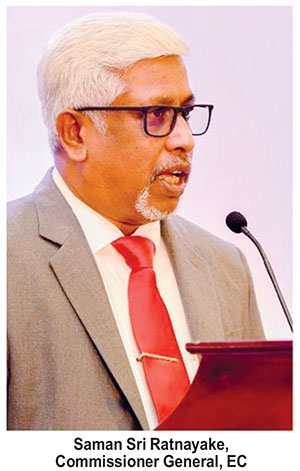 Can political chaos be addressed through electoral reforms and constitutional amendments? Has the EC really examined the current crisis and how political uncertainty, in addition to waste, corruption and irregularities, contributed to the overall deterioration of the country’s financial status and unprecedented instability.
Can political chaos be addressed through electoral reforms and constitutional amendments? Has the EC really examined the current crisis and how political uncertainty, in addition to waste, corruption and irregularities, contributed to the overall deterioration of the country’s financial status and unprecedented instability.
A few hours after the end of the National Voters’ day celebration, the government announced an inevitable increase in diesel and petrol prices. It would be pertinent to mention that India, too, now exercise the right to intervene here by way of revising fuel prices. Lanka India Oil Company (LIOC) that set up base here in 2003, is affiliated to Indian Oil Corporation Limited that comes under the purview of its Ministry of Petroleum and Natural Gas.
One-time distinguished career diplomat Hardeep Singh Puri, who had served the Indian High Commission in Colombo during the volatile1984-1988 period when Indian-trained terrorists waged war against Sri Lanka, is India’s Minister of Petroleum and Natural Gas and Housing and Urban Affairs. Rightly or wrongly he was then suspected to be involved in much more than diplomacy by especially those who saw how he and his wife lobbied certain key journalists behind the scene and the clout they wielded.
On March 10, the day LIOC announced staggering price increases in petrol and diesel that caused turmoil here, Sri Lanka’s High Commissioner in New Delhi Milinda Moragoda met Minister Puri. The meeting took place at the Ministry of Urban Affairs in New Delhi. Let me reproduce a statement verbatim issued by the Sri Lankan High Commission in New Delhi following the meeting between Moragoda and Puri: “At the outset, High Commissioner Moragoda thanked Minister Puri for the assistance that India has provided to Sri Lanka as envisaged under the four-pillars of cooperation, agreed during the visit of Sri Lankan Finance Minister Basil Rajapaksa to India in December last year, in particular the USD 500 million line of credit to purchase petroleum products. Additional assistance, too, has been provided by India to enhance Sri Lanka’s petroleum stocks.
“High Commissioner Milinda Moragoda also briefed Minister Puri on the challenges that Sri Lanka is currently facing as regards to the supply and distribution of petroleum products and their impact on the Country’s energy sector. The High Commissioner and the Minister discussed modalities through which India and Sri Lanka could further expand cooperation in the petroleum sector to help overcome the present crisis.
The discussion also focused on a range of issues pertaining to the energy sector, including ways and means through which Sri Lanka could establish long-term strategic ties in the petroleum, oil, gas and related logistics sectors.”
The Government increased fuel prices at midnight on March 11 following LIOC price revisions on Feb 06, 24 and March 10 that resulted in the sharpest difference in retail price of a litre of petrol and diesel at LIOC and Ceypetco service stations, Rs 92 and Rs 77, respectively. The bottom line is that Sri Lanka’s pricing formula is in the hands of India.
That is the unpalatable truth. Obviously, there is no mechanism to ensure that upward or downward revisions of fuel prices are decided through consultations. Instead, a foreign power can take that decision on our behalf. In other words, Sri Lanka’s Energy Minister is actually former High Commission staffer Puri.
How can EC ensure political parties do not follow agendas inimical to Sri Lanka’s national interests? Recent high profile but unsubstantiated accusations that had been directed at Finance Minister Basil Rajapaksa over him pursuing a pro-American agenda are a matter for concern.
President Gotabaya Rajapaksa removed Jathika Nidahas Peramuna (JNP) leader Wimal Weerawansa and Pivithuru Hela Urumaya (PHU) leader Udaya Gammanpila from Industries and Energy portfolios, respectively, following their clash with Basil Rajapaksa, who is also the founder of the SLPP. The political turmoil has taken a new turn with the SJB stepping up attacks on Basil Rajapaksa in Parliament.
The Opposition repeatedly questioned Speaker Mahinda Yapa Abeywardena over Basil Rajapaksa remaining mum in Parliament over the rapid deterioration of the economy. The failure on the part of political parties represented in Parliament to reach a consensus on national response to the current crisis is evidenced by the plight of the electorate. Instead, a sharply divided government has allowed the deterioration by refusing to take remedial measures.
The Opposition has sought to exploit the situation to its advantage whereas a section of the parliamentarians, including some of those accommodated on the SLPP National List, angered the top SLPP leadership by presenting an alternative set of proposals meant to restore the devastated economy.
The EC cannot afford to turn a blind eye to the utter chaos in Parliament and outside for want of a national response at a time of unprecedented crisis.
EC on key issues
The EC comprised five persons, namely Nimal Punchihewa, S.B. Divaratne, K.P.P. Pathirana, M.M. Mohammed and P.S.M. Charles, the only lady in the outfit. The EC has made representations to the Parliamentary Select Committee (PSC) on electoral reforms as well as the nine-member Committee, headed by Romesh de Silva, PC. The EC representations dealt with electoral reforms and constitutional reforms, respectively. The writer would like to briefly discuss the touchy issue of the need to reduce the number of registered political parties and the proposal to recall those who pursue strategies contrary to the pledges they made at the election and in the printed manifestos of the respective political parties.
Having asserted that the country cannot afford to continue with 76 registered political parties, the EC has proposed ways and means to reduce that number. Examination of EC’s proposals submitted to the PSC and Romesh de Silva’s committee proves how unsatisfying the current situation is.
A sensible Parliament will certainly give serious consideration to EC’s proposals. Nothing can be as important as the proposal to recall lawmakers if they stepped out of line. Will leaders of political parties have the strength to accept the proposal to establish a mechanism to remove MPs?
The recent dismissal of charges in respect of the Treasury bond scam perpetrated on March 29, 2016, by the Colombo High Court Trial-at-Bar due to the flawed indictments raised many eyebrows. Yahapalana Finance Minister Ravi Karunanayake has been among those who benefited as a result of the AG’s lapse. The indictments had been filed during Dappula de Livera, PC’s tenure as the AG. Sanjay Rajaratnam succeeded de Livera in May last year.
The Trial-at-Bar comprising Damith Thotawatte (Chairman), Manjula Thilakaratne and M. Izzadeen by a majority decision dismissed the relevant charges.
Can anyone explain the circumstances under which the indictment had been filed against the Perpetual Treasuries Limited (PTL) contrary to the Public Property Act? The AG’s Department cannot be unaware that in terms of the Public Property Act indictments can be filed only against individuals.
The Trial-at-Bar ruling should be examined against the backdrop of the AG and the Commission to Investigate Allegations of Bribery or Corruption (CIABOC) withdrawing as much as over 50 cases since the last presidential election, in addition to the cases dismissed by various courts.
The AG as well as the CIABOC owed explanation as to how so many cases failed to achieve desired results or were withdrawn under controversial circumstances. The Bar Association of Sri Lanka (BASL) and the civil society should raise these issues. Can BASL and civil society remain silent as the situation continues to deteriorate?
Midweek Review
Canada plays politics with Sri Lanka again ahead of its national election
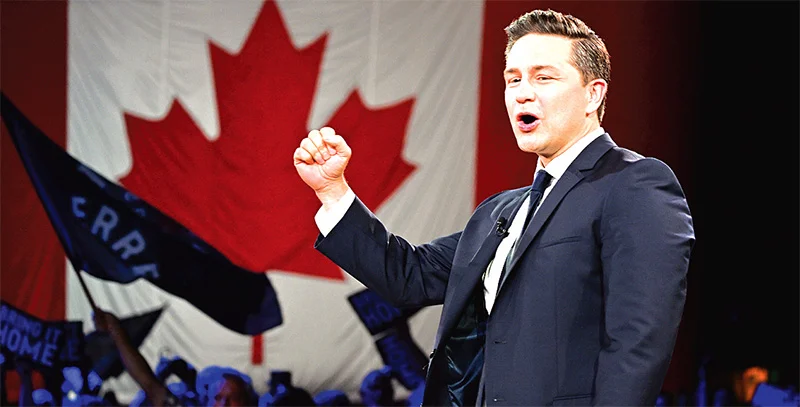
UK Premier Keir Starmer reiterated his Government’s commitment to addressing justice, accountability of reconciliation in Sri Lanka and issues faced by Tamils, including advocating for human rights and justice for Tamil victims.
The often repeated declaration was made at the Thai Pongal celebration at 10 Downing Street on 20th January. The Indian High Commissioner in the UK Vikram Doraiswami was among those present. Perhaps Starmer hadn’t considered India’s culpability as the regional sponsor of a terror project in Sri Lanka that claimed the lives of as many as 70,000 combatants and civilians. Among the dead were former Indian Prime Minister Rajiv Gandhi and over 1,300 Indian soldiers.
Doraiswami joined the Indian Foreign Service in 1992, the year after the LTTE assassinated Gandhi at Sriperumbudur in Tamil Nadu. Would Starmer dare to raise India’s accountability and also look into the UK role in bolstering Tamil terrorism? The UK allowed a free hand to the LTTE with the group’s International Secretariat functioning from London without any restrictions. The LTTE wouldn’t have achieved status as a major terrorist organization if UK didn’t facilitate its operations. The writer’s assessment is that the British backing for Tamil terrorism was much more than that of Canada.
By Shamindra Ferdinando
Over 17 years after the decimation of the terrorist group, the Liberation Tigers of Tamil Eelam (LTTE), with a conventional fighting might militarily by our security forces, Canada and the UK are still seeking to punish Sri Lanka for pulling off that most unlikely victory against their deadly pet that they nurtured covertly.
Both the British and Canadian governments alike play politics at Sri Lanka’s expense. Canadian Conservative Party leader Pierre Poilievre recently stated that he would lead the world in seeking prosecutions in international courts of the Rajapaksas and other “criminals” who have persecuted the Tamil people. Influential groups of Sri Lankans of Tamil origin are represented in both the UK and Canadian parliaments.
Poilievre, whose party is widely expected to win the election, was speaking at the ‘Harvest of Hope’ event in Toronto on 18 January, marking Thai Pongal and Tamil Heritage Month. Obviously, the Conservative Party leader seems to be confident that he could win over Canadians of predominantly Sri Lankan Tamil origin at the October parliamentary elections.
Poilievre sought to appease the Tamil Canadians close on the heels of Premier Justin Trudeau’s announcement that he would resign after a successor is chosen. Rightwing Poilievre, early last year, declared he would seek to prosecute Sri Lanka at the International Court of Justice (ICJ) and appoint lawyers to pursue charges against Lankan “war criminals” in international criminal courts.
However, the Conservative Party wouldn’t find it easy to entice Tamil Canadians as during Trudeau’s 10-year premiership, when Canada went out of its way to attack Sri Lanka. The Liberal Party, under Trudeau’s leadership, humiliated war-winning Sri Lanka at any given opportunity.
Recently, the Canadian media quoted Trudeau as having said: “I intend to resign as party leader, as Prime Minister, after the party selects its next leader through a robust nationwide competitive process.” Whoever replaces Trudeau will continue hostile policy towards Sri Lanka. One-time central banker Mark Carney and former Deputy Prime Minister Chrystia Freeland are in the fray. The Liberal Party is scheduled to announce the winner on 09 March.
All political parties represented in the Canadian Parliament, in May 2022, unanimously and arrogantly agreed that Sri Lanka perpetrated genocide during the war against the LTTE. On the basis of that unsubstantiated decision that had been endorsed by both Liberal and Conservative Parties, the Canadian Parliament recognized 18 May as the Tamil Genocide Remembrance Day. These overwhelmingly white accusers, however, forget the fact that like all of Americas, Canada, too, was established by committing numerous acts of genocide against its first citizens. And, to this day, they continue to perpetrate such acts with impunity. Such pale faces, with so much innocent blood on their hands, have the audacity to accuse small countries, like Sri Lanka, that refused to yield to terrorists, who were subtly supported by them, the same way they back even Islamic terrorists when it suits them as we clearly saw in Syria for example.
Sri Lanka brought the war to a successful conclusion on May 18, 2009 though LTTE leader Velupillai Prabhakaran was only killed on the banks of the Nanthikadal lagoon at the dawn of the following day as his surviving band tried to breakthrough security forces lines.
What the Conservative Party Leader Poilievre could do to outdo Trudeau who had glorified Prabhakaran’s macabre project by targeting some Sri Lankan leaders responsible for eradicating the LTTE terrorism?
Over the years, those who had received Canadian citizenship, as well as others awaiting same, funded the LTTE as it killed and maimed thousands of Sri Lankans. Obviously, both Liberals and Conservatives, as well as other political parties, represented in Canadian Parliament, have conveniently forgotten thousands of Tamils killed by the LTTE. Canadian political parties are also silent on the origins of terrorism in Sri Lanka that may have claimed the lives of as many as 70,000 people. The dead included 1,300 Indian soldiers, members of rival Tamil terrorist groups, several dozens of politicians, like President Ranasinghe Premadasa as well as one-time Indian Premier Rajiv Gandhi, among many others.
Canadian political parties have bent backwards to appease Tamil Canadian voters. With their eyes on the still growing significant number of Tamil Canadian votes, they haven’t at least bothered to examine why Sri Lanka took on the separatist conventional military challenge. Canada never realized the need for a negotiated political settlement in Sri Lanka as long as the LTTE wielded conventional military power. Had the LTTE overwhelmed Sri Lankan military, Canada would have been one of the first countries to congratulate the triumph of terrorism here. That is the reality.
Fortunately, by the time Trudeau received the Liberal Party leadership in 2013, and became the Premier in late 2015, more than four years after Sri Lanka brought the LTTE to its knees, called “the deadliest terrorist group” even by the Federal Bureau of Investigation, was not in a position to resurrect its military. In other words, once considered invincible by so-called experts, had been truly defeated. Canada, like many other like-minded countries, responded with shock and dismay at the way the LTTE collapsed after having vowed to defeat the military.
Sri Lanka created history by eradicating the LTTE militarily. Sri Lanka’s triumph dispelled the myth spread by interested parties that our armed forces were incapable of defeating a major terrorist group with conventional fighting means, like the Tigers.
Tamil electorate on a new path
Eradication of the LTTE is no longer a major issue at national or lower level elections in Sri Lanka. Anura Kumara Dissanayake’s superlative performance in the Northern and Eastern regions, at the last presidential and parliamentary elections in Sept. and Nov., last year, respectively, proved that predominantly Tamil electorates couldn’t be significantly influenced by post-war issues.
Regardless of much touted accountability issues and assurances to pursue the Geneva agenda, Tamil parties failed to garner the required support of the Tamil electorate. They overwhelmingly voted for Tamil candidates fielded by the National People’s Front (NPP) at the general election and thereby inflicted unprecedented defeat on the Illankai Thamil Arasu Kadchi (ITAK).
Finally, the JVP-led NPP won all the Northern and Eastern electoral districts. The Tamil-speaking people declared beyond doubt that they wanted to move ahead and not be entrapped in the past. They obviously realized that a politically motivated high profile Western campaign against Sri Lanka is not meant to help restore their shattered lives but play politics with an issue. Those who cannot stomach Sri Lanka’s triumph over terrorism still want to haul up the war-winning country before international criminal courts. However, ITAK, and smaller Tamil political parties, have now realized that accountability issues do not attract voters. Over 17 years after the end of the war, young voters, in no uncertain terms, had indicated that they aren’t interested in pursuing a political agenda, based on accountability issues.
Earlier, the ITAK-led Tamil National Alliance (TNA) wholeheartedly represented the LTTE interests.
Perhaps, the NPP, too, has realized that its often repeated promise to release political prisoners is irrelevant. Even if the NPP wanted to release some to deceive the people, no such prisoners are held by the government. There are only a handful of Tamil convicts and few others held in terms of the PTA (Prevention of Terrorism Act). The convicts are responsible for major attacks and high profile assassinations. Actually political prisoners are nothing but a non-issue and those demanding their release from detention are only fooling themselves.
It is high time Tamil political parties give up their primary strategy revolving around accountability issues. Having received the LTTE’s backing both in and out of Parliament at the outset of Chandrika Bandaranaike Kumaratunga’s second term, the ITAK is now struggling to come to terms with unfavourable situations in the North.
Failure on the part of M.A. Sumanthiran, PC, to retain his Jaffna district seat, meant that the ground situation had changed drastically. That was nothing but a severe warning issued not only to Sumanthiran but to all Tamil politicians who have been essentially advancing an accountability agenda like a beggar’s wound. However, Canada appeared to have failed to recognize the changing situation on the ground. Perhaps, the Canadian High Commission (CHC) should re-examine post-national election developments closely. The CHC should wait till the conclusion of the Local Government polls early this year to carry out reassessment as at least a section of the Tamil electorate may switch their allegiance back to the ITAK.
But, the writer is of the view that dynamics have changed and those genuinely concerned about the wellbeing of the Tamil people shouldn’t depend on accountability issues to promote political agenda. In fact, having played ball with the LTTE throughout the war and backed Prabhakaran’s decision to indiscriminately use hapless Tamil civilian human shields on the Vanni east front, the ITAK should be investigated for its culpability for war crimes. The ITAK had no shame at all as it fully cooperated with the LTTE’s despicable strategies. Today, the ITAK wouldn’t dare to mention that it recognized the LTTE in 2001 as the sole representative of the Tamil speaking people. Of course that was done at gunpoint. The late R. Sampanthan had no choice but to cooperate with Prabhakaran’s strategy meant to build a political front subservient to them.
Canada had no qualms in mollycoddling the ITAK in spite of that political party endorsing recruitment of child soldiers. The highpoint of the LTTE-ITAK/TNA relationship was the engineering of Ranil Wickremesinghe’s defeat at the 2005 Nov. presidential election that paved the way for Mahinda Rajapaksa’s victory, resumption of war in August 2006 by the LTTE and its decimation militarily by the armed forces.
Canada seeks Tamil Canadians support
Against the backdrop of the 2015, 01 Oct. Geneva Resolution that had been treacherously backed by the then Sri Lankan government, headed by Maithripala Sirisena, and Ranil Wickremesinghe as the President and Prime Minister, Canada took a series of measures to step up pressure on the war-winning country. In May 2022 Canada publicly announced that Sri Lanka perpetrated genocide. Trudeau dismissed Sri Lanka’s protests though Ottawa didn’t have absolutely anything to back its extremely politically motivated claims. Shame on Canada and its Premier.
It would be pertinent to mention that Premier Stephen Harper’s Conservative government, too, couldn’t stomach Sri Lanka’s triumph over terrorism. In fact, both Conservatives and Liberals competed with each other to censure Sri Lanka. They felt Canadians of Sri Lankan origin could be easily won over by censuring Sri Lanka.
In May 2014, the Canadian High Commission in Colombo asked the writer whether The Island could publish a hard-hitting statement issued by the then High Commissioner Shelley Whiting prominently ahead of Sri Lanka’s Victory Day parade. The writer, in his capacity as the News Editor of The Island, gave the HC an assurance that regardless of what Whiting had to say it would receive front-page coverage. The HC wanted to know whether any sections would be deleted. Assurance was given that it would be carried, sans any alterations. As promised The Island carried the Whiting’s statement that challenged President Mahinda Rajapaksa’s decision to celebrate the country’s triumph over terrorism.
Whiting, who had served at their Kabul mission prior to being posted to Colombo, declared that Canada wouldn’t be represented at the Victory Day parade that was to be held in Matara on May 18, 2014. In spite of proscribing the LTTE and the World Tamil Movement in 2006 and 2008, respectively, funds flowed to the LTTE. The LTTE couldn’t have sustained conventional fighting for over two decades without uninterrupted funding from the West. Canada remained a major source of funding until the very end when the Sri Lankan military decimated the LTTE militarily in a series of operations on the Vanni east front.
Having won the 2015 presidential election, Maithripala Sirisena, in consultation with Premier Ranil Wickremesinghe, cancelled the Victory Day parade. Canada must have been thrilled. Whiting’s condemnation of the military celebration was the only instance a foreign government called for the ending of the annual event held to mark a worthy victory clinched against so many odds.
In Oct. 2015, treacherous Yahapalana leadership (UNP-SLFP combine) co-sponsored a US-led accountability resolution against the Sri Lankan military. There hadn’t been a previous instance of any country moving/backing a resolution targeting its own armed forces and political leadership at the Geneva-based United Nations Human Rights Council (UNHRC).
In May 2022 Canada declared Sri Lanka perpetrated genocide. In early January 2023, Ottawa sanctioned former presidents Mahinda Rajapaksa, Gotabaya Rajapaksa, Staff Sergeant Sunil Ratnayake and Lieutenant Commander Chandana Prasad Hettiarachchi. Both Ratnayake and Hettiarachchi had been earlier sanctioned by the US, one of the worst human rights offenders, for committing what it called serious crimes.
Interestingly, no Western government has so far sanctioned war-winning Army Chief Field Marshal Sarath Fonseka though a number of senior officers, including General Shavendra Silva (US) and Maj. Gen. Chagie Gallage (Australia). The US threw its weight behind Fonseka at the 2010 presidential election. Having accused Fonseka’s Army of murdering thousands of Tamils, the LTTE proxy Tamil National Alliance (TNA) formed an alliance with the UNP and the JVP to defeat Mahinda Rajapaksa. Their project failed pathetically as the electorate inflicted a massive defeat on the celebrated Sinha Regiment hero. The drubbing was such Mahinda Rajapaksa polled over 1.8 mn votes more than Fonseka.
In the absence of cohesive policy on the part of Sri Lanka in countering unsubstantiated war crimes accusations, Western powers pursued an agenda inimical to Sri Lanka. The idea was to push Sri Lanka to offer a political package that addressed Tamils’ aspirations. In other words, Western powers wanted Sri Lanka to grant what the LTTE couldn’t secure through terrorism driven war.
Midweek Review
It reeks in the Palk Bay!
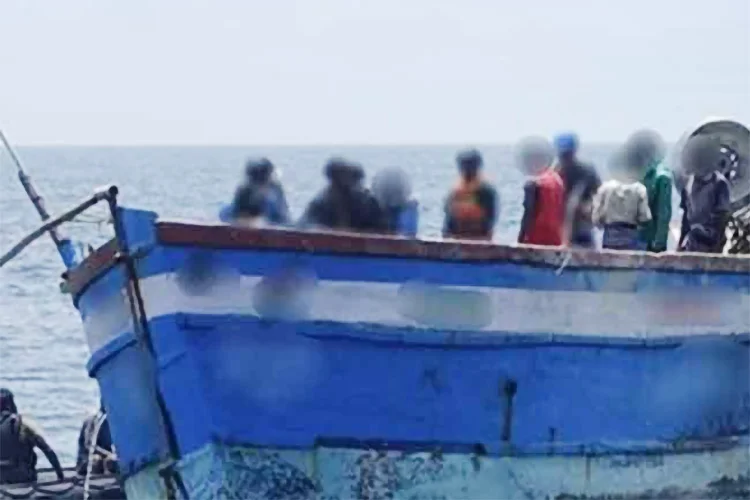
 A shooting involving Indian fishermen and Sri Lanka Navy personnel within the island’s territorial waters, and injuries sustained in apprehending the poachers is in the news, yet again. And as is often the case in these countless and never-ending confrontations and competing claims and counter claims in state rituals, we have two versions of the event. But one thing is indisputable: Indian fishermen had entered Sri Lankan waters illegally and thereby came within the jurisdiction of the island nation’s laws and legal apparatuses including interventions by its navy.
A shooting involving Indian fishermen and Sri Lanka Navy personnel within the island’s territorial waters, and injuries sustained in apprehending the poachers is in the news, yet again. And as is often the case in these countless and never-ending confrontations and competing claims and counter claims in state rituals, we have two versions of the event. But one thing is indisputable: Indian fishermen had entered Sri Lankan waters illegally and thereby came within the jurisdiction of the island nation’s laws and legal apparatuses including interventions by its navy.
Naval action followed by competing statements by India and Sri Lanka are mere state rituals that have not been able to address long-standing practices that pre-existed the formation of nation-states. For the longest time, when national identities, citizenship, and maritime borders did not exist in the legal sense we understand them today, what we now call Sri Lankan and Indian fishermen waded undeterred into each other’s waters and engaged in fishing to their hearts’ content. They even lingered for extended periods of time in each other’s lands during specific fishing periods. I recall engaging in a conversation at the turn of the century with one such fisherman from South India who had decided to settle in Chilaw long ago. In his case and that of many of his comrades at the time, it was a matter of marrying into the Sinhala speaking fisher families. Over time, these people blended into local communities. At the height of these activities and even after both India and Sri Lanka gained independence, the long arm of the nation-states’ laws and national interests did not intervene in such activities beyond a point. But this changed as nation-states evolved into what Ashish Nandi has called ’garrison states’, militarised borders were drawn and bodies of laws developed governing cross-border travel.
Notwithstanding national borders and the associated practices of statecraft and competing nationalisms, fishermen in the two neighbouring countries have continued to wade into each other’s waters consciously disregarding what is known as the International Maritime Boundary Line (IMBL) due to its invisibility. Such border violations are often deliberate and a matter of routine because fishermen often get away with this infringement. However, the kind of intrusion followed by violence now in the news is not the norm, but the exception.
In a statement issued on 28 January 2025, India’s Ministry of External Affairs noted that “an incident of firing by the Sri Lankan Navy during the apprehension of 13 Indian fishermen in the proximity of Delft Island was reported in the early hours of this morning.” It further noted, that “out of the 13 fishermen who were on board the fishing vessel, two have sustained serious injuries and are currently receiving treatment at the Jaffna Teaching Hospital.” But the statement from the Sri Lanka Navy differs in important details. It notes that Sri Lanka’s “Northern Naval Command observed a cluster of Indian fishing boats poaching in the Sri Lankan waters off Valvettithurai, Jaffna in the dark hours of 27 Jan 25.” This location is much closer to the Sri Lankan coast than what the Indian statement claims, yet it is evident from both statements that the incident took place well within Sri Lanka’s territorial waters. This discrepancy in the statements is intriguing as the two locations are approximately 62.4 km apart. Interestingly, the contested island of Kachchatheevu is 22.4 km from Delft, the location given in the Indian statement, and 84.7 km from Valvettithurai. Therefore, a careful reader may not be faulted in wondering if locating the scene closer to Kachchatheevu is deliberate, given that the island is a bone of contention between the two countries.
The Navy statement further states, “subsequently, the Northern Naval Command mounted a special operation to send away those fishing boats from the island waters, deploying naval craft. During this operation, the Navy seized an Indian fishing boat [that] continued to remain in Sri Lankan waters, while marshalling illegal fishing activities and collecting the fishing harvest. The operation also led to the apprehension of 13 Indian fishermen aboard the fishing boat.”
For Sri Lanka, this is not merely an accident that can be wished away as the somewhat clinical Indian statement does. It goes beyond protecting the maritime borders of the country, to preserving a crucial source of livelihood of many people in northern Sri Lanka and other parts of the island. It is both a bread-and-butter issue as it is a matter of national interest. Therefore, the Sri Lanka Navy has acted precisely in the manner that it should, as is expected and is within its mandate. Is it also not ironic that the bleeding hearts of southern Indian politicians who are up in arms about the so-called discrimination and abuse of their Tamil brethren in Sri Lanka by its government, seem to turn bone dry when their constituent fishermen callously plunder the resource-rich fertile waters of Sri Lanka, thereby remorselessly depriving their Tamil brothers and sisters of their livelihood.
The Sri Lankan statement further notes, “the Sri Lanka Navy boarding team was compelled to conduct noncompliance boarding as the Indian fishing boat continued to maneuver aggressively, without complying with the Navy’s lawful orders and its duty, during the process of taking the boat into custody. On this occasion, the Indian fishermen have acted aggressively, maneuvering their fishing boat in a hostile manner and behaving confrontationally with the Navy. However, while boarding the fishing boat in accordance with the authority vested in the Navy, the Indian fishermen, as an organized group, have attempted to assault naval personnel and made an attempt to snatch a firearm from a naval officer, endangering the lives of the naval personnel. In the process, an accidental fire has taken place, causing slight injuries to two Indian fishermen.” So unlike in the Indian statement which refers to ‘serious injuries’ the Sri Lankan statement refers to ‘slight injuries.’

What is seen here is not a deliberate act of shooting as the Indian statement and much of the Indian reporting on the incident insinuates, but an accident that has occurred due to the aggression and unlawful behaviour of Indian fishermen in a location in the sovereign territory of another country, they had no business of being in, in the first place. Intriguingly, none of these details are present in the Indian statement. It merely says that in addition to lodging a ‘strong’ complaint against the incident with the Acting High Commissioner in Delhi and the Sri Lankan Ministry of Foreign Affairs, “government of India has always emphasized the need to treat issues pertaining to fishermen in a humane and humanitarian manner, keeping in mind livelihood concerns. The use of force is not acceptable under any circumstances whatsoever. Existing understandings between the two Governments in this regard must be strictly observed.”
India’s Ministry of Externa Affairs lodging a complaint with our Acting Hish Commissioner in Delhi and a similar complaint being made by its High Commission to our Foreign Ministry is the height of absurdity. While our Foreign Ministry and missions may be numb to such action, we should be mindful that the main infraction — Indian poaching — happened in our waters and therefore comes under the jurisdiction of Sri Lankan laws, in the dispensation of which accidents can also happen.
In any case, this statement itself may seem well articulated in the lofty corridors of performative and orchestrated diplomacy and the Indian Ocean conference circuit. But it makes little sense beyond as an example of excessive verbosity in the real world of cross-border poaching and naval action in the darkness of the night involving aggressive culprits and the threatened livelihoods of citizens of a sovereign country. Besides, it was just over six months ago that a young Sri Lankan sailor brutally met his end because of the aggressive manoeuvering of an Indian trawler in Sri Lankan waters. Therefore, these statements are naught but mere rhetoric, of no use to the Sri Lankan fishermen who — through no fault of their own — have to bear the brunt of Indian infractions and incursions into their bread-basket.
What is obvious in these rituals of statecraft is the woeful absence of proactive action on the part of Sri Lanka. If India can summon our Acting High Commissioner to their Ministry of External Affairs and lodge a ‘strong’ complaint over an accident stemming from an illegal Indian activity that took place in our waters, did our Foreign Ministry summon the Indian High Commissioner to protest against his compatriots illegally and perpetually entering our waters, behaving aggressively towards our navy and depriving a section of our citizens of their only livelihood? Did our Foreign Ministry ask him why they have opted to report basic facts wrong in their statement? Silence in such situations is not only extremely dangerous but also smacks of pusillanimity. This kind of institutionalized timidity on the part of Sri Lanka does not augur well for the country at the time we are celebrating our supposed ‘Independence,’ and is also counterintuitive to the notion of national interest.
This general lack of intent towards meaningful action is also evident in the Joint Statement of 16 December 2024, issued during President Anura Kumara Dissanayaka’s visit to India which states that “acknowledging the issues faced by fishermen on both sides and factoring in the livelihood concerns, the leaders agreed on the need to continue to address these in a humanitarian manner. In this regard, they also underscored the need to take measures to avoid any aggressive behaviour or violence. They welcomed the recent conclusion of the 6th Joint Working Group Meeting on Fisheries in Colombo. The leaders expressed confidence that through dialogue and constructive engagements a long-lasting and mutually acceptable solution could be achieved. Given the special relationship between India and Sri Lanka, they instructed officials to continue their engagement to address these issues.” Here, the omission of any reference to the destructive bottom-trawling fishing method is conspicuous by its stark absence. It is indeed unfathomable that the Sri Lankan team did not insist on the inclusion of this critical reference in the statement.
Rampantly used by Indian fishermen, bottom-trawling disrupts the seabed, marine ecosystem and biodiversity of the Palk Bay, while boosting India’s seafood exports and yielding high profits while destroying the Sri Lankan fishermen’s livelihoods. For this reason, Sri Lanka banned bottom-trawling in 2017. However, none of these are in the Joint Statement of 16 December 2024 or the Sri Lanka Navy statement of 28 January 2025, and have also not been taken up with the Indian High Commissioner in Colombo. This is not only a failure of Sri Lankan foreign policy in action but also a complete compromise of our country’s national interest.
In this context, the real culprits in the failure to resolve the problem definitively are the leaders of the Indian and Sri Lankan states — politicians and bureaucrats alike. Why has technology not been resorted to more thoughtfully in this situation where the required technology actually exists? For the longest time, both sides have been waxing eloquent about attaching non-tamperable and permanently switched-on transponders to fishing boats which will inform the Navies or Coast Guards of the two countries when maritime border violations take place. As a technologically advanced country, India has the higher capacity to produce the required innovative mechanisms and tools for this purpose that can be used in both countries for mutual benefit. Bilateral collaboration of this nature can actually bear fruit rather than the hollow discourses of rhetorical diplomacy and statecraft.
For India, these issues are important only insofar as they resonate with Tamil Nadu politics and therefore possible vote banks. In reality, it is never about the lives or livelihoods of poor South Indian fishermen or their confiscated properties. For Sri Lanka, it is a matter of ill-defined sovereignty and the livelihood of a significant section of the people in the north. At the same time, this unfolds in a situation where the Sri Lankan Navy is unable to patrol the country’s maritime borders effectively, a known fact which Indian fishermen exploit as a matter of routine.
If both countries are adequately serious beyond issuing mere statements after the fact, these incursions are easily stoppable. However, once the technology is put in place as a matter of law, both countries must enforce them to the letter, and patrol the borders more effectively. But, pending the fruition of such law, Indian fishermen, cannot be allowed to plunder Sri Lankan resources. It is also high time, the Sri Lankan government, with the kind of overwhelming mandate it has received from the people, make it very clear to the Indian state that endless incursions into our territorial waters and ravishing of the country’s natural resources can no longer be tolerated. And if legitimate deterrence is to be used in protecting our borders and resources as do all sovereign states including India, so be it. This is the minimum we expect from our government in its pursuit of our national interest.
Midweek Review
The Teen Mum Question
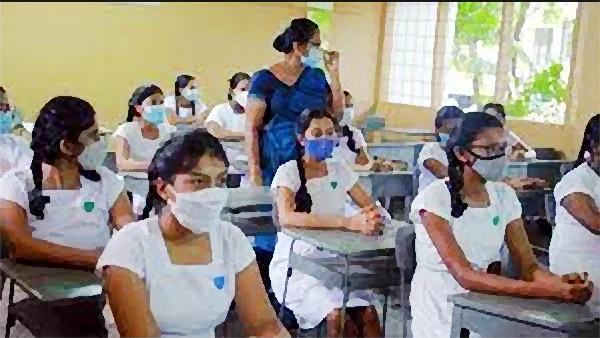
By Lynn Ockersz
Into the shadows of shame,
Is the Teen Mum slinking,
Now that the seed in her womb,
Which she didn’t aim at planting,
Is almost close to ripening,
Rendering her heavy with child,
But judge her not in haste,
And go for the First Stone,
For, she’s a hapless victim,
Of an education needing updating,
With a knowledge of do’s and don’ts,
On the question of human mating,
And going into ‘proud independence’,
May this issue be taken up for discussing.
-
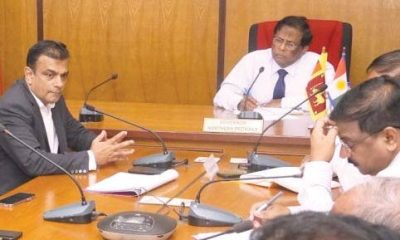
 News4 days ago
News4 days agoNew Bangalore-Jaffna flights in the works
-
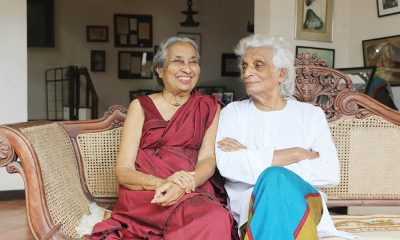
 Features6 days ago
Features6 days agoA singular modern Lankan mentor – Part I
-

 Editorial7 days ago
Editorial7 days agoRegime changes and scandals
-
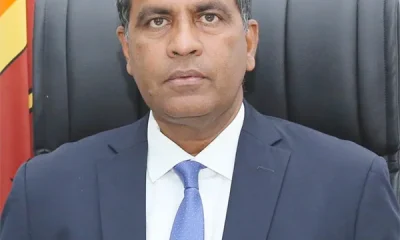
 News7 days ago
News7 days agoCustoms cleared thousands of ‘marked’ containers sans examination beginning last year
-
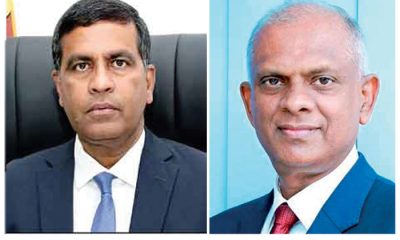
 News2 days ago
News2 days agoCID questions top official over releasing of 323 containers
-
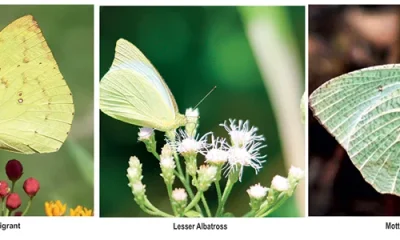
 Features7 days ago
Features7 days agoButterfly migration fading away
-
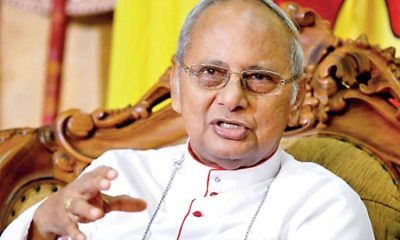
 News4 days ago
News4 days agoCardinal says ‘dark forces’ behind Easter bombs will soon be exposed
-
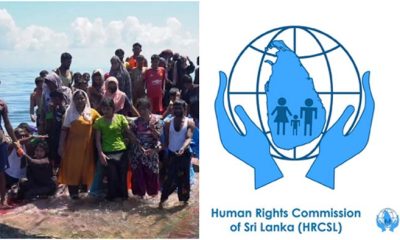
 News4 days ago
News4 days agoHRCL reports on Rohingya asylum seekers


